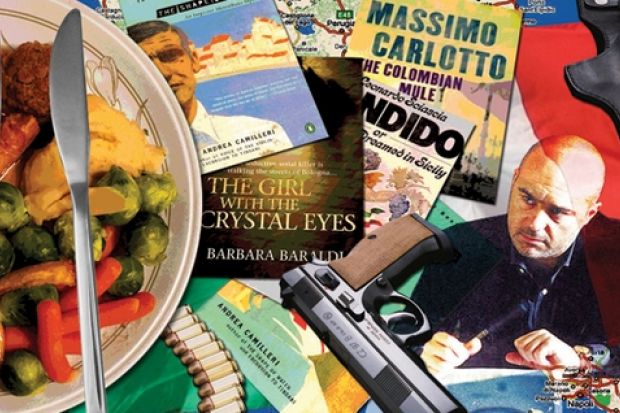Christmas and New Year television is one big burp, a mere regurgitation of what you can see any time. Mercifully there were exceptions. Italian Noir: The Story of Italian Crime Fiction (BBC Four, Monday December, 9.30pm) reflected the festive season far better than Come Dine with Me Celebrity Christmas Special (Channel 4, Wednesday 22 December, 9pm). Who wants to watch a bunch of people eating and chatting? Most of us had just had that experience and some were glad it wouldn't be repeated for another 12 months.
This diverting documentary dealt with a subject that dominated the headlines: murder. Joanna Yeates' frozen body had been found in a ditch. And she wasn't the only one. A 15-year-old was drowned in the bath and a 17-year-old was shot dead in Peckham. Death has been busier than Father Christmas.
Andrea Camilleri, author of a series of books featuring Inspector Montalbano, said that few cases "are ever truly resolved". He was born in Sicily, the home of the Mafia, but they play a very small part in his novels. "I don't put them centre stage," he says, "because I don't want to glamorise them." We could do with him at the BBC, then we wouldn't have Vince Cable on Strictly Come Dancing.
The Mafia are a much more substantial presence in the work of Leonardo Sciascia, also from Sicily. Giuliana Pieri from Royal Holloway, University of London appeared to know an awful lot about them. Cosa Nostra, she explained, were responsible for a culture in which no one trusted anyone else. Working in higher education, we can have no idea what that feels like.
Maxim Jakubowski talked up Sciascia's prose. When he mentions a lemon, your tongue fizzes. But the affable Mr Jakubowski must have been talking about the original Italian. The extract that flashed up on screen was notable only for its confused imagery: "a huge black sponge" both soaks up light and floods the landscape with it. Let's hope, for the translator's sake, that Sciascia doesn't have any friends in long overcoats.
The depiction of violence is nothing new in Italian art. There's a strain of sadism that runs from the Colosseum through Catholicism to the novels of Massimo Carlotto, who was framed for a murder he didn't commit and who took years to clear his name. "You won't find any sentiment in his fiction," announced Barry Forshaw, author of The Rough Guide to Crime Fiction, with a smile. He seemed smitten with Barbara Baraldi, whose book The Girl with the Crystal Eyes follows the bloody exploits of a female vigilante. "She's utterly brutal but drenched in femininity," he cooed.
Barbara herself echoed her fellow writers who saw the crime novel as a way of investigating Italian society, particularly its Fascist past and the terrorism of the 1970s known as "the years of lead". They all agreed that it was impossible to establish the truth and that nothing would change, much less improve.
The episode of Inspector Montalbano (BBC Four, Monday December, 10.30pm) that followed cast doubt on all these assertions. The inspector was portrayed as a gourmet, an Olympic swimmer, a football star and a marriage counsellor. Amazingly, he still had some energy left for police work, soothing egos at the station, educating his chief about the necessity for evidence, solving a murder, and temporarily freeing a young man from prison so he could celebrate New Year with his mother. Well, this is almost Italy. And being almost Italy there has to be a love interest. Livia, Montalbano's girlfriend, would make a monk change his habit, but even she can't rouse the inspector who is worn out from being an all-round good guy. Ah, so that's what's meant by these stories never having closure.
Agatha Christie continues to shape British crime drama, but Lynda La Plante is fast transforming the genre. For a start, her heroes are actual policemen and women rather than little old ladies or diminutive Belgians. And there's torture, murder, brutality, drugs, duplicity and even a bit of swearing too. The adaptation of Deadly Intent, the fourth book in the DI Anna Travis series (ITV One, Monday 3 January, 9pm), reveals our heroine trying to find out who shot a former police officer.
She'd succeed a lot quicker if she didn't have to spend so much time fending off the attention of her male colleagues. The pathologist tried the direct approach. "Would you like a drink?" That failed. So he changed tack. "It's a PCR approach which involves initial amplification of the target using a tag strand specific primer." DI Travis remained unimpressed. So that was the last time he was going to help her. The drama shows the rich dumping on the poor. Isn't something like that happening now? Maybe television can break new ground as well as wind.
Register to continue
Why register?
- Registration is free and only takes a moment
- Once registered, you can read 3 articles a month
- Sign up for our newsletter
Subscribe
Or subscribe for unlimited access to:
- Unlimited access to news, views, insights & reviews
- Digital editions
- Digital access to THE’s university and college rankings analysis
Already registered or a current subscriber? Login
